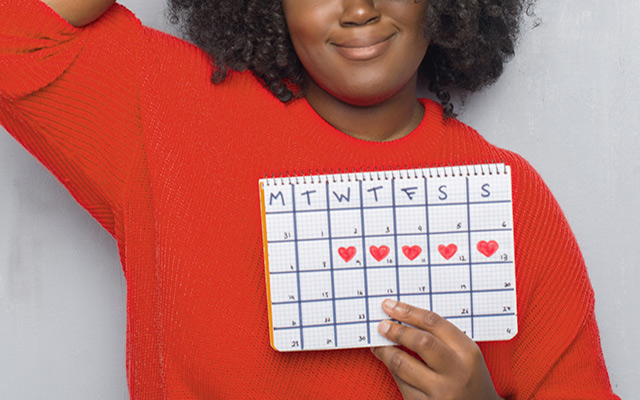While dating my first serious boyfriend, in 2014, I decided to get on the birth control pill. I visited a clinic near my university, where the doctor asked a few questions and checked my weight and heart rate. I picked up a prescription later that afternoon.
I remember feeling excited that I could protect myself from pregnancy by taking a pill; like it was a miracle. And it was purportedly easy to use, safe, and noninvasive.
As the spring semester progressed, however, my mental health took a nosedive. One day I’d be crying and shaking through a panic attack, and the next I was glued to my bed, completely unmotivated to shower or even eat.
Over the next year, I tried everything I could to feel better. Despite my best efforts, my symptoms only got worse.
The Stress of a Student, or Something Else?
My research and chats with friends about their experience with oral contraception had led me to believe that I’d avoid the more dire side effects by choosing a progestin-only pill, which contains only a synthetic form of progesterone. So, when I made the decision to start a contraceptive, I specifically requested that option — I liked that it had just one hormone, as opposed to the more popular combination pill, which also contained a synthetic form of estrogen.
I’d read about links between certain combination pills and an increased risk of blood clots or mood-related changes. I hadn’t heard of progestin-only pills causing the same issues, so when I started experiencing symptoms of depression and anxiety, I didn’t connect them with my birth control.
Over the next few months, I tried different tools to soothe those symptoms. I exercised. I meditated. I did yoga and established a regular sleep schedule. I experimented with herbs I had read about, such as nettle leaf, oat straw, and chickweed. I began taking magnesium and combinations of vitamin D and B vitamins. Nothing worked.
I struggled to hold it together through the next two semesters into the fall of 2015. When winter break arrived, I was thrilled to go home and relax after an exhausting week of finals.
But the anxiety and mood swings didn’t stop. The pit of dread remained in my stomach, even when I woke up on Christmas. That’s when I knew something was really wrong.
That morning, I sat up in bed, struck by a moment of clarity. This wasn’t the typical stress of a high-achieving college student. Throughout my childhood and early adulthood, I’d been a curious, energetic, and relatively happy person. But now, I’d felt like a shell of myself for more than a year. Most days, I was barely hanging on. Something wasn’t right.
On my drive back to school after break, I was listening to an episode of the Stuff Mom Never Told You podcast about women suffering from anxiety. I was only half listening until I heard a line that grabbed and shook me by the shoulders: “Postpartum depression is due to an increase of progesterone in the body after giving birth. . . .”
Progesterone was linked to depression? I felt an icy stab of recognition. I’d spent the last year taking pills with a synthetic form of progesterone. Could there be a connection between my birth control and my deteriorating mental health? I didn’t want to believe it, but I began to consider the possibility. I pulled over to do a cursory search online.
Although many articles were careful not to draw a causal link between birth control and anxiety or depression, I found forums filled with women experiencing the same symptoms as me, which made me feel less alone.

Searching for a Solution
I made an appointment with the student health clinic in January 2016. The doctor nodded along as I talked about my anxiety, not looking up from her computer. I was adamant about my concerns regarding birth control. After I finished, she asked whether I was sexually active. When I confirmed that I was, she cautioned against relying on nonhormonal methods like fertility tracking and condoms, citing their lower efficacy rates. I felt unheard.
I walked back to my apartment, cold and hopeless. What other options did I have? I was a 20-year-old student with no desire to get pregnant anytime soon. I needed to be on birth control.
I did some research and found a nonhormonal method the doctor hadn’t mentioned: the copper IUD. Copper creates an inhospitable environment for sperm cells and keeps them from reaching an egg.
In February 2016, I visited a different clinic near my school, hoping the staff would be more helpful. I fought back tears while sharing the symptoms I’d been struggling with. The nurse seemed to shrug off my concerns. She asked whether I was drinking too much or taking drugs, explaining that many college students suffered from the depressant effects of both. I was struggling to respond when the doctor walked in and asked me the reason for my visit.
Unlike the nurse, the doctor validated my concerns and said that my experience wasn’t uncommon. I felt comforted, yet I wondered: If this is something that happens to other women, why hasn’t anyone told me about it?
Knowing that hormonal birth control could be contributing to my symptoms was all I needed to hear. I decided to get the copper IUD. Although the nonhormonal device comes with its own set of potential side effects, including irregular periods as well as increased and more-intense cramping during periods, I believed the benefits outweighed the risks in my situation.
The insertion was painful, but the procedure took less than five minutes.
When I got up to leave, the doctor handed me a card with the dates of insertion and removal. I couldn’t believe the latter: February 2028. Twelve long, beautiful years of hormone-free birth control lay ahead of me. I almost broke down with relief.
My suspicions were confirmed over the next couple of months as my depression and anxiety symptoms began to resolve. I felt significantly better after one cycle, then dramatically improved after two. And even just knowing that the pill had contributed to the way I had been feeling was a comfort.
Whenever I felt anxious or depressed during the first month, I was able to put distance between myself and my emotions, especially as more and more information validated my experience. In November 2016, months after I got my IUD, a comprehensive Danish study found that women taking hormonal birth control were 23 percent more likely to need an antidepressant. Progestin-only forms were found to create an even greater propensity for mood disorders.
Aviva Romm, MD, an integrative practitioner and author of Hormone Intelligence, emphasized the Danish study’s connection between the pill and depressive symptoms. She cited findings that women who had started taking birth control pills were having to go on antidepressants — many for the first time.

Hormone-Free and Happy
It’s now been more than seven years since I got the copper IUD. My periods are predictably heavy, and sometimes I have to take pain relievers for my cramps, which are worse than when I was on hormonal contraception. But regaining my mental and emotional health has been worth it. The IUD has given me the stability I needed. I feel like myself again: sometimes a little anxious, but with mental clarity and a sense of calm I couldn’t access while taking the pill.
Birth control is an incredible invention that I feel lucky to use. Many people take the pill or use other forms of hormonal birth control and find that it works for them. But using hormones to protect oneself from pregnancy is a big decision — one with potential consequences for physical and mental health. After experiencing some of those consequences myself, I’m grateful I was able to find and access an alternative that was better suited to my body.
We deserve to know what we’re putting in our bodies and how it might affect us. Our sexual health shouldn’t have to come at the cost of our emotional well-being.

Katie’s Top 3 Tips for Success
- Trust your gut. When Katie heard that progesterone was linked to postpartum depression, she followed the gut instinct that told her the progestin-only birth control she was taking might be doing the same thing to her body — and mind.
- Get another opinion. Doctors are experts, but that doesn’t mean they all agree or that they have all the information. If you’re not getting the care you’d like from one healthcare professional, Katie recommends seeking a second (or even a third!) opinion.
- Knowledge is power. Modern medicine can be practically miraculous, but that doesn’t mean healthcare solutions don’t have drawbacks (or that you can’t ask your healthcare providers some questions). Katie considers all aspects of her health and is a careful consumer. She still takes the doctor’s orders, but she educates herself on potential physical, mental, sexual, and emotional side effects of any prescriptions or healthcare advice she receives.
My Turnaround
For more real-life success stories of people who have embraced healthy behaviors and changed their lives, visit our My Turnaround department.
Tell Us Your Story! Have a transformational healthy-living tale of your own? Share it with us!






This Post Has 0 Comments